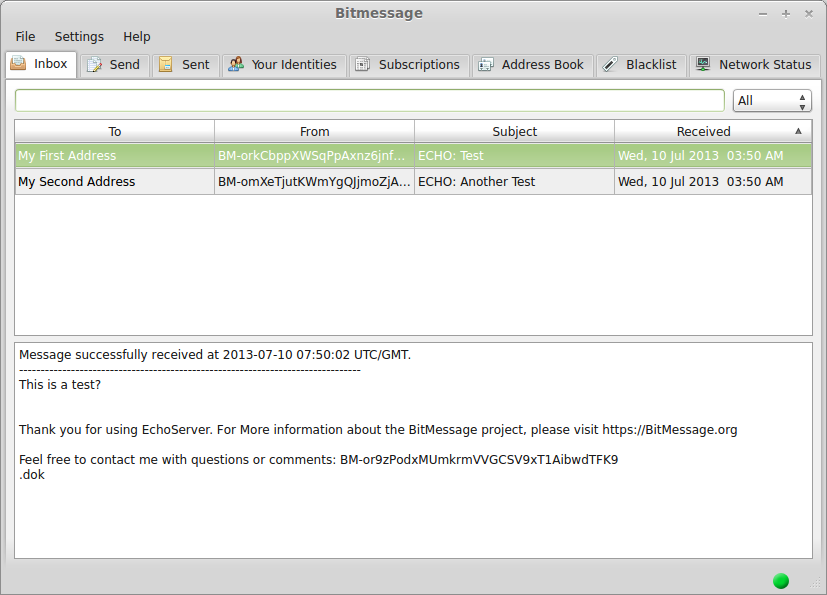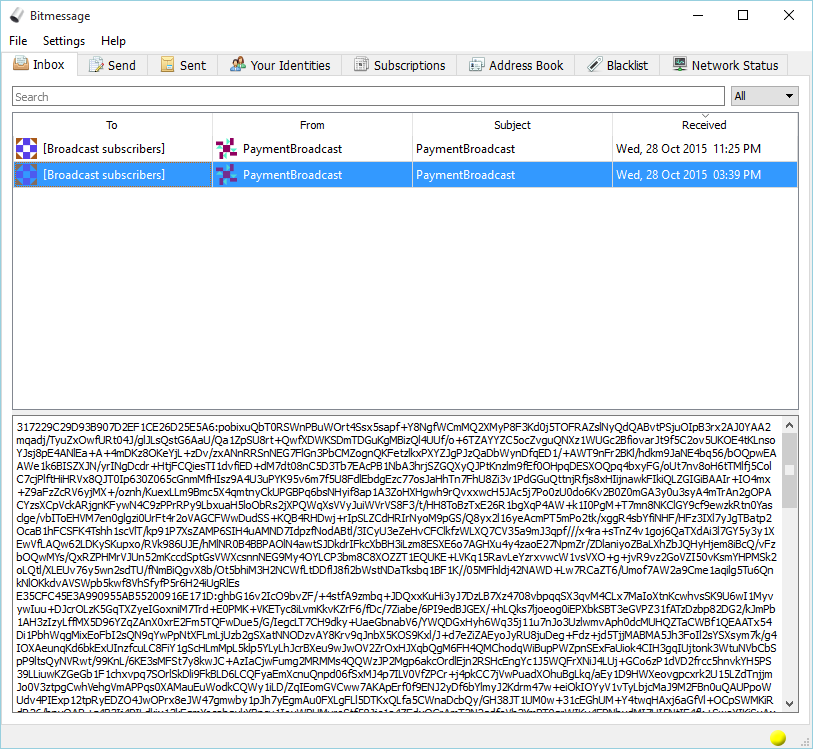| Original author(s) | Jonathan Warren |
|---|---|
| Developer(s) | Bitmessage Community |
| Initial release | November 2012; 8 years ago |
| Stable release | 0.6.3.2 / February 13, 2018; 3 years ago |
| Repository | |
| Written in | Python, C++ (POW function) |
| Operating system | Windows, macOS, Linux, FreeBSD |
| Available in | English, Esperanto, French, German, Spanish, Russian, Norwegian, Arabic, Chinese |
| Type | |
| License | MIT |
| Website | bitmessage.org |

Bitmessage is a decentralized, encrypted, peer-to-peer, trustless communications protocol that can be used by one person to send encrypted messages to another person, or to multiple subscribers.
Bitmessage Mail
Step 1: Download Bitmessage here for either Windows or Mac OS X. The program is contained in one file called Bitmessage, but temporary files are stored elsewhere in the user’s AppData folder. BitMessage was created to fight back against this. BitMessage is a P2P communication system that is used to send coded messages to other people in a decentralized way, using basic coding to keep both the sender and receiver of messages anonymous. Bitmessage is a peer-to-peer communications protocol based on the Bitcoin crypto-currency used to send encrypted messages to another person or to many subscribers. It is decentralized and trustless, meaning that you need-not inherently trust any entities like root certificate authorities.
In June 2013, the software experienced a surge of new adoptions after news reports of email surveillance by the US National Security Agency.[1]
Bitmessage was conceived by software developer Jonathan Warren, who based its design on the decentralized digital currency, Bitcoin. The software was released in November 2012 under the MIT license.[1]
Bitmessage gained a reputation for being out of reach of warrantless wiretapping conducted by the National Security Agency (NSA), due to the decentralized nature of the protocol, and its encryption being difficult to crack. As a result, downloads of the Bitmessage program increased fivefold during June 2013, after news broke of classified email surveillance activities conducted by the NSA.[1]
Bitmessage has also been mentioned as an experimental alternative to email by Popular Science[2] and CNET.[3]
Some ransomware programs instruct affected users to use Bitmessage to communicate with the attackers.[4]
References[edit]
- ^ abcMax Raskin (2013-06-27). 'Bitmessage's NSA-Proof E-Mail'. Business Week.
- ^Dan Nosowitz (2013-08-09). 'What Are Your Options Now For Secure Email?'. Popular Science.
- ^Molly Wood (2013-08-13). 'Gmail: You weren't really expecting privacy, were you?'. CNet.
- ^'Chimera Ransomware Tries To Turn Malware Victims Into Cybercriminals'. International Business Times. 2015-12-04.
Further reading[edit]
- Bitmessage: A Peer‐to‐Peer Message Authentication and Delivery System (Jonathan Warren) - Bitmessage white paper
External links[edit]

Bitmessage App
